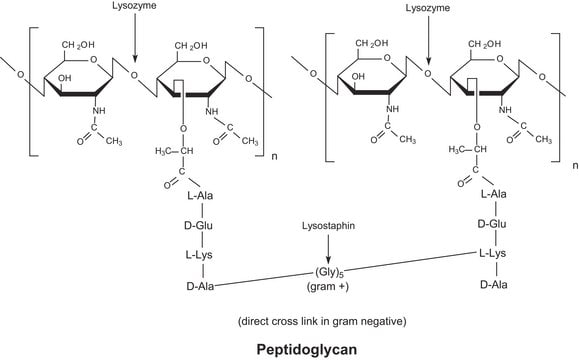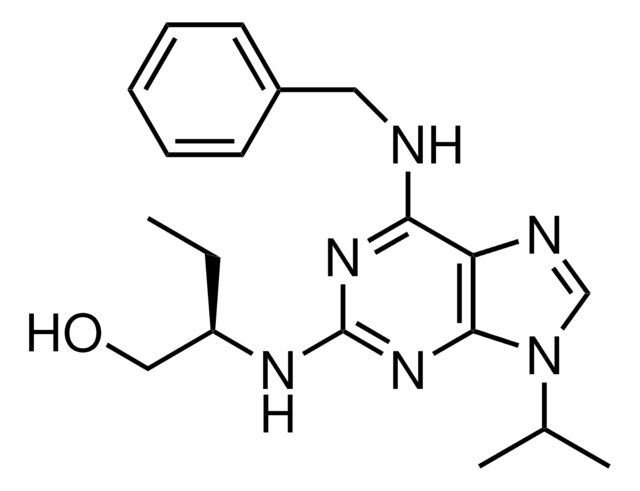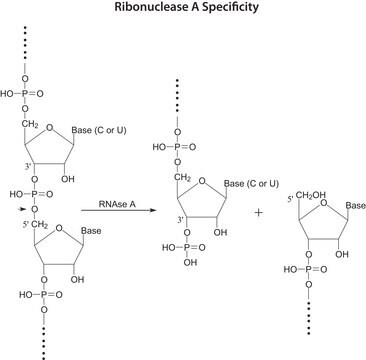M1891
Myelin Basic Protein bovine
≥90% (SDS-PAGE), lyophilized powder, suitable for activity assay
Synonym(s):
MBP
Sign Into View Organizational & Contract Pricing
All Photos(1)
About This Item
Recommended Products
biological source
bovine
Quality Level
Assay
≥90% (SDS-PAGE)
form
lyophilized powder
mol wt
18.4 kDa
storage condition
(Keep container tightly closed in a dry and well-ventilated place)
technique(s)
activity assay: suitable
solubility
water: 1 mg/mL, clear, colorless to faintly yellow
UniProt accession no.
storage temp.
−20°C
Gene Information
cow ... MBP(618684)
General description
Research Area: Cell Signaling
Myelin basic protein (MBP), a single-chain polypeptide consisting of 170 amino acids with a methyl-arginine, is a peripheral membrane protein. This crucial structural component of the myelin sheath is the second-most abundant protein in myelin representing about 30% of the total myelin protein.
Myelin basic protein (MBP), a single-chain polypeptide consisting of 170 amino acids with a methyl-arginine, is a peripheral membrane protein. This crucial structural component of the myelin sheath is the second-most abundant protein in myelin representing about 30% of the total myelin protein.
Application
Myelin Basic Protein (MBP) bovine has been used:
- in in vitro methylation reaction
- as a substrate in in vitro immunoprecipitation-kinase assay to measure Cds1 (the S-phase-specific checkpoint effector kinase) activity
- to prepare phosphorylated MBP, which is used as a substrate in phosphatase assays
Used as a kinase substrate.
Biochem/physiol Actions
Mutation of the myelin basic protein gene induces dysmyelination. It is used to induce experimental allergic encephalomyelitis.
Myelin basic protein (MBP) plays a vital role in the formation of the myelin sheath and is associated with various neurological disorders. MBP functions as an antigenic target in the autoimmune disease experimental allergic encephalomyelitis (EAE). MBP plays an essential role in cytoskeletal turnover and membrane extension. Additionally, it is also involved in Fyn-mediated signaling pathways, sequestration of phosphoinositide, and regulation of calcium homoeostasis. MBP functions as an in vitro substrate for mitogen-activated protein kinase (MAP) kinase and aids in the purification and functional studies of enzymes.MBP serves as a potential neuroreceptor. It can stimulate the proliferation of lymphocytes in vitro. MBP plays a key role as a substrate in the mitogen-activated protein (MAP) kinase activation pathway. Based on lymphocyte stimulation, MBP can be used to detect cancer. It is used in several immunological studies. MBP also contributes to the preservation of the lipid: protein organization within myelin.
Quality
May contain traces of urea-glycine buffer salts.
antibody
Product No.
Description
Pricing
related product
Storage Class Code
11 - Combustible Solids
WGK
WGK 3
Flash Point(F)
Not applicable
Flash Point(C)
Not applicable
Personal Protective Equipment
dust mask type N95 (US), Eyeshields, Gloves
Choose from one of the most recent versions:
Already Own This Product?
Find documentation for the products that you have recently purchased in the Document Library.
Functional characterization of a mitochondrial Ser/Thr protein phosphatase in cell death regulation.
Lu G
Methods in Enzymology, 457, 255-273 (2009)
Michal Jasinski et al.
Plant physiology, 147(2), 719-731 (2008-04-09)
The analysis of gene expression in Arabidopsis (Arabidopsis thaliana) using cDNA microarrays and reverse transcription-polymerase chain reaction showed that AtOSA1 (A. thaliana oxidative stress-related Abc1-like protein) transcript levels are influenced by Cd2+ treatment. The comparison of protein sequences revealed that
Regulation of protein arginine methyltransferase 8 (PRMT8) activity by its N-terminal domain.
Sayegh J
The Journal of Biological Chemistry, 282(50), 36444-36453 (2007)
Hsl7 is a substrate-specific type II protein arginine methyltransferase in yeast.
Sayegh J and Clarke SG
Biochemical and Biophysical Research Communications, 372(4), 811-815 (2008)
Ibtisam Al-Harrasi et al.
Genes, 11(5) (2020-05-23)
The date palm (Khalas) is an extremophile plant that can adapt to various abiotic stresses including drought and salinity. Salinity tolerance is a complex trait controlled by numerous genes. Identification and functional characterization of salt-responsive genes from the date palm
Our team of scientists has experience in all areas of research including Life Science, Material Science, Chemical Synthesis, Chromatography, Analytical and many others.
Contact Technical Service







